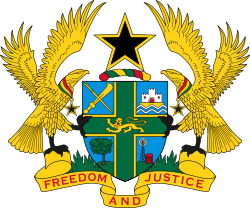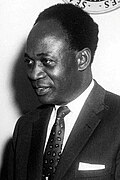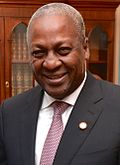 |
|---|
| Constitution |
| |
This is a list of the heads of state of Ghana, from the independence of Ghana in 1957 to the present day. [1]
Contents
- Monarch (1957–1960)
- Governor-general
- Republic (1960–present)
- First Republic (1960–1966)
- Military rule (1966–1969)
- Second Republic (1969–1972)
- Military rule (1972–1979)
- Third Republic (1979–1981)
- Military rule (1981–1993)
- Fourth Republic (1993–present)
- Timeline since 1960
- Term of office in years
- Standards
- Demographics
- References
- External links
From 1957 to 1960 the head of state under the Constitution of 1957 was the queen of Ghana, Elizabeth II, who was also the monarch of other Commonwealth realms. [2] The monarch was represented in Ghana by a governor-general. [3] Ghana became a republic within the Commonwealth under the Constitution of 1960 and the monarch and governor-general were replaced by an executive president. [4]



















